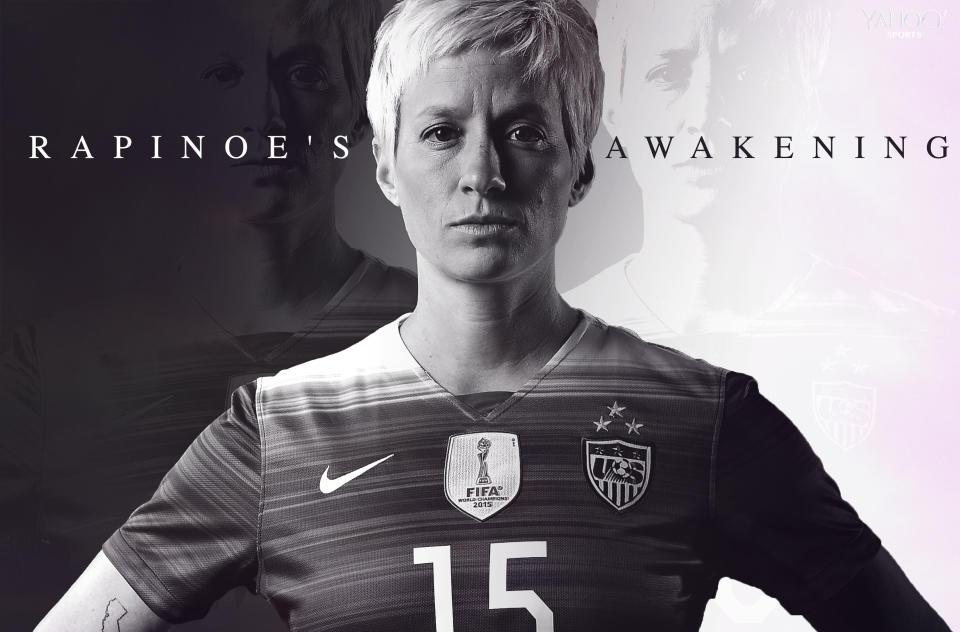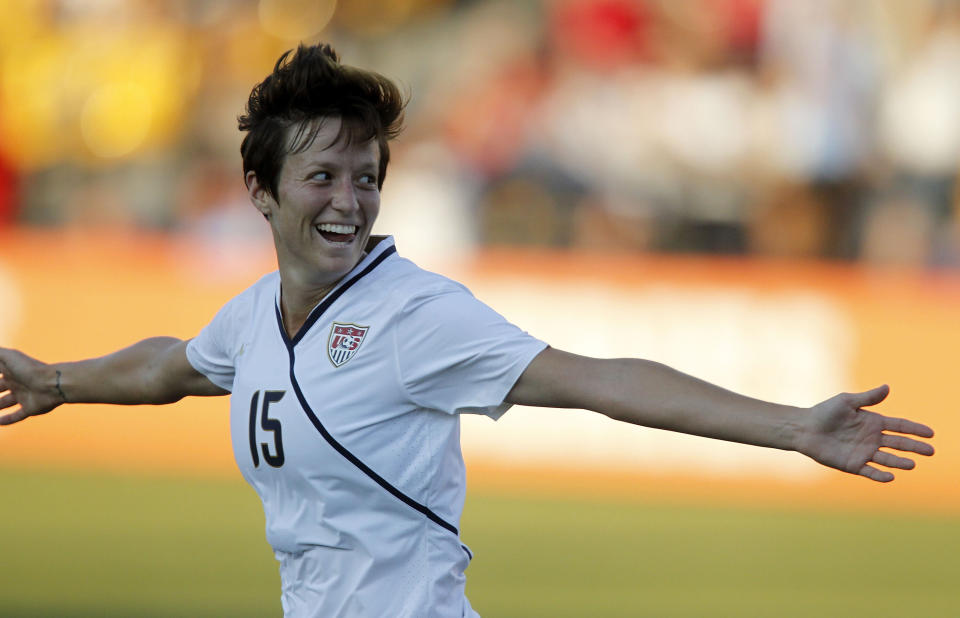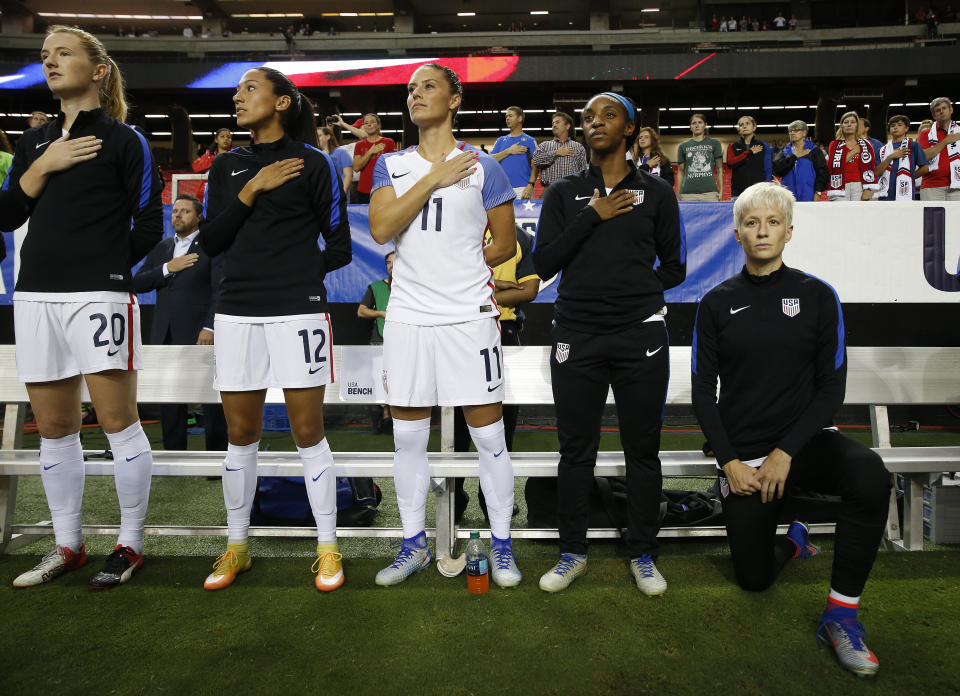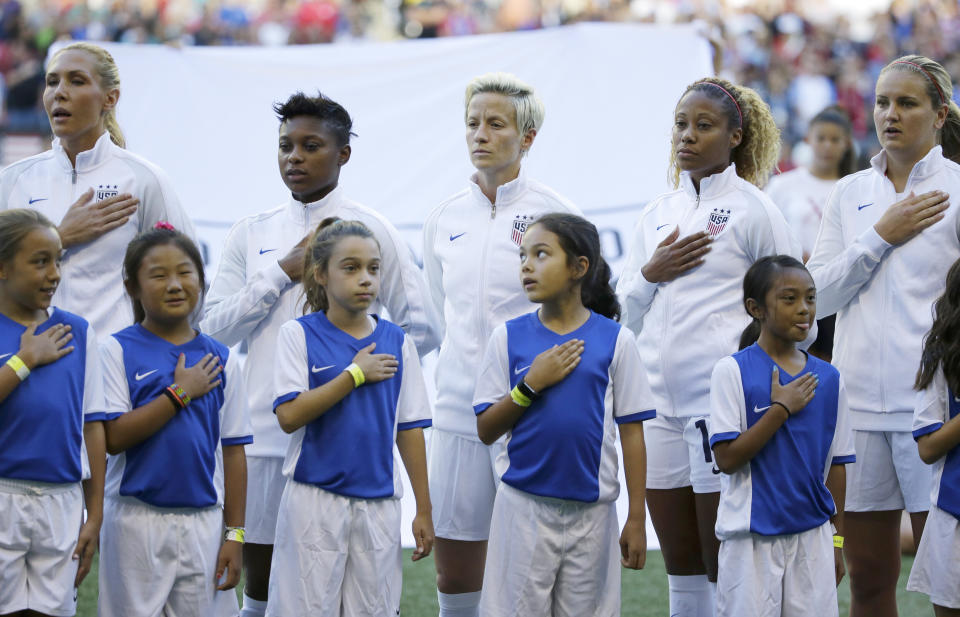Megan Rapinoe is a 'walking protest'

Megan Rapinoe used to sing. With grace and gusto, on fields from Frankfurt to Florida to Montreal, eyelids occasionally fluttering. Her chest would rise and fall with the trumpets on the “Star Spangled Banner,” lyrics rolling off her tongue, patriotism oozing from her entire figure.
She was an American hero, and belted out a national anthem befitting of one. Whether she was preparing to win gold medals or World Cups, whether with dazzling foot skills or majestic crosses, she would cup her hand to a U.S. Soccer crest and join the chorus. And whether the year was 2011 or 2012 or 2015, she would pull at the heartstrings of millions. She'd ripple nets, then serenade viewers with "Born in the USA." She was equal parts inspirational and flamboyant, her blonde hair jibing with an irresistible personality, her game exuding joy.
She was an American hero. And eight years after first earning the title, she very much still is. She even has a captain's armband to prove it.
But nowadays, when the trumpets perk up, and when immense pride swells within the 10 women around her, Rapinoe doesn't flinch. She stands and stares, lips pursed, cheekbones taut, hands clasped behind her back, face expressionless.
"I'll probably never put my hand over my heart," she says matter-of-factly. "I'll probably never sing the national anthem again."
She is sitting in an air-conditioned hotel lobby in Raleigh, North Carolina, on a radiant October morning, her jort-wearing legs crossed, her words and mannerisms exceptionally relaxed. She blends humor with thoughtfulness like few can. She is in so many ways the same Megan Rapinoe you fell for back in 2011, the same flamboyant blonde, with the same inextinguishable enthusiasm for everything from soccer to social causes to style.
And yet, in between sips of coffee, before a brief break to take a call from girlfriend Sue Bird, she explains one difference – one illuminating, life-changing difference between that Pinoe and this one.
She is now awake.
She will march onto French fields this summer for the FIFA Women’s World Cup and face the flag of a country she still loves deeply. But she will do so with a comprehensive understanding of, in her opinion, just how riddled with inequality and injustice that country is. Inequality and injustice she dropped to a knee to protest in 2016. Inequality and injustice she was always aware of, but which she now feels compelled to do something about.
Yet she will represent the government she believes enables it. And a soccer federation who suppressed her protest with what she calls a “backwards rule”; a federation she is currently suing. And a president she calls “sexist,” “misogynistic,” “small-minded,” “racist” and “not a good person.”
The inherent contradictions made me wonder: When Megan Rapinoe does toss on a USA kit, with President Donald Trump sitting in the White House back home … does it ever feel odd?
"Not really," Rapinoe says without even a second's hesitation. "Because I feel like I'm a walking protest."
The activist’s roots

The most courageous, open-minded social justice warrior American soccer has ever known grew up 10 miles east of one of the most conservative cities in California – in a Christian family, across the street from a church.
Megan Rapinoe was born in Redding and raised in Palo Cedro, the roots of an activist unknowingly sprouting on over three acres out in the beautiful NorCal countryside. She was one of five siblings, and a twin. And the twins – my goodness did they love to play. Basketball, soccer, hockey, football – whatever Megan and Rachael Rapinoe could get their hands on. They'd fish, swim, ride bikes. They'd roam freely on nearby fields, nurturing the type of creativity that has fueled the USWNT's attack sporadically for more than a decade.
The source of Megan's activism, however, is a bit trickier to trace. I set off in search of stories, examples, anything that foretold of the "walking protest." I found a few fuzzy tales of confrontations with authority, but not many. There was the "showdown" between fifth-grade Rapinoe twins and middle-school bullies. There was the fracas during a soccer game as teens. A rival coach shoved Megan. Megan stood up to him. The incident resulted in a hearing and a year-long suspension for the coach. But those are about the only details all Rapinoe witnesses can agree on.
Megan figures a "natural activist strain" must have always been within her. "I don't think you grow into something like that or change," she says. "You either have it or not, and then you cultivate it." Parenting might have helped do exactly that. "What my parents taught us," Rachael says, "was the genuine nature in which you treat people. They are very giving, and very loving, and non-judgmental. And I think when you grow up seeing that, it just instills these really wonderful, sincere, down-to-Earth qualities in you."
Middle school, however, sent an outgoing, kind-hearted free spirit receding into her shell. Megan, in search of her identity, felt "really alone" and "lost." Though she was steadfast in her convictions, she rarely vocalized them.
"I think she really started finding her voice when she started finding her sexuality," Rachael says. "Maybe part of the reason why she was quiet growing up was because she felt a little different. She didn't quite feel comfortable in her skin. But once she realized who she was, and why she felt the way she felt ... that's when she found strength in her voice."
The ‘launching pad’

On a gray Friday evening in late December, with rain pelting Long Island and a modest indoor soccer facility providing shelter, Megan Rapinoe leans forward in a chair and listens. Then she speaks. And as she does, a couple dozen unblinking eyes stare up at hers. Fifteen feet away, dozens of ears eavesdrop. Camera phone-wielding parents jockey for position.
It is Hour 2 of 3 at the final Rapinoe SC training clinic of 2018, and in between scrambled soccer drills, amid a cacophony of youthful chatter, on a small segment of turf carved out specifically for this purpose, questions for Pinoe won't relent. They come from children of all ages, primarily girls, every single one of them in awe. From kids wearing Rapinoe jerseys of all colors and No. 15 U.S. national team shorts. They ask their idol about her habits; her history; her best friends; her favorite players. About injury recoveries, bicycle kicks, coaches and meals. They eagerly await answers, their unwavering attention the sort grade-school teachers dream of.
They are precisely the type of minds Rapinoe realized she could shape upon breaking in with the USWNT last decade. "I learned very early on on this team that we have a specific platform, and we reach a lot of people," she explains. With the platform came responsibility, but also opportunity. Opportunity to make an impact beyond soccer. "Realizing the team had that platform meshed pretty naturally with wanting to do the right thing," Rapinoe says. It was opportunity, therefore, that she has rarely shied away from since.
She started with causes near and dear to her. The natural "launching pad," as friend and former U.S. teammate Lori Lindsey calls it, was coming out. When sparkling 2011 World Cup performances raised her profile, and when chances to publicly reveal that she was gay arose, Rapinoe recognized how powerful such an announcement could be. She had been out to friends and family since college. But now she realized there were millions of kids grappling with their sexuality just like she once had, in environments that deemed homosexuality taboo; millions of kids who had hundreds of straight athletes to look up to but very few, if any, potential role models who publicly self-identified as LGBTQ.
Some, including Rapinoe's parents, worried about consequences. About endorsements disappearing. And about hate. "I really wanted her to have every advantage as a professional athlete," says her mother, Denise. "I wanted her to have every opportunity, monetarily."
But Megan felt passionate. And eventually, by the overwhelmingly positive reaction to her revelation, vindicated. To this day, she receives messages of all kinds, "People saying that I sort of gave them the inspiration, or gave them the push or the confidence that they needed to be themselves, or tell their families [they're gay], or come out," Rapinoe says.
"When you're out, it's only one part of who you are. But when you're not out, it's just this all-consuming thing. The deeper in the closet you are, the more you lie, the more it becomes this all-consuming thing that it really doesn't have to be, and it takes over your life. So people getting to a point where they can just live their lives and be happy, if I can have any part in that, that's pretty special."
It's what she calls "a little gold nugget in life," one that "just keeps coming." And it has emboldened her to keep speaking. To do more. To branch out. To wake up.
The awakening and the backlash

Not that Megan Rapinoe was ever asleep. It's just that, well, she used to sing, and no longer does. And for a tumultuous few weeks back in September 2016, she didn't stand, either.
In the four years since coming out, Rapinoe hadn't just won a World Cup and Olympic gold. She'd become a staunch advocate for LGBTQ rights and pay equity, partnering with non-profits and sitting at roundtables with Hillary Clinton. But around the time "things got kind of nasty" in America, a bit before the 2016 presidential election, she experienced what she calls an "awakening."
Rapinoe has never suffered from racial injustice. Never been racially profiled. "But Colin Kaepernick very much inspired me, and inspired an entire nation, and still does, to actually think about these things," she says. "The way he spoke about them so clearly, so matter-of-fact, wasn't trying to convince anyone. Just, ‘This is what is happening, this is what I'm willing to do about it.' I found that extremely inspiring and convicting. Like, how can you not support?"
So she knelt. Without forewarning for family members, days after Kaepernick did, she became the first white athlete and first female athlete to follow his lead.
Back in Northern California, in a county that would vote 65-28 for Donald Trump over Hillary Clinton that November, Denise Rapinoe's phone began "ringing off the hook." When she realized why, "it was kind of shocking for us," she recalls now. "We were pretty upset about that, her dad and I." Not upset about the subject of their daughter's protest, nor her message, she clarifies; but taken aback by her method.
"She's very patriotic," Denise says of Megan. "We're a very patriotic family. Her dad was drafted during the Vietnam War. ... Her grandfather, who lives with us, he's 94, World War II vet. My father, Korean War, suffered many injuries. I mean, we have a long family history of service to the country.
"I just said, ‘Couldn't there have been another vehicle?' That's how I felt. To [Megan], there wasn't another one at that point. She doesn't regret it. But there's been a lot of backlash."
Even locally, in a city that one summer earlier had officially declared July 21 Megan Rapinoe Day. "There was a lot of just really irate people," Denise says. She felt their ire at Jack's Bar & Grill, a famous local steakhouse and her employer for three decades. Patrons, aware that she was Megan's mother, would confront her. One longtime customer complained that pictures of Megan still adorned the restaurant's walls. Owners eventually decided to remove them, inciting controversy. Denise notes that there were also "amazing showings of support." And that some Redding residents had their eyes opened, minds changed. But the vitriol, from coast to coast, was fierce.
Rachael Rapinoe felt it almost instantly as well, even thousands of miles away in the Bernese Alps. "I was on this two-week trip, hiking, in and out of WiFi," she recalls of that momentous September Sunday. "And then all of a sudden, I started getting all these hateful, bashful emails to our company email address." The twins had founded Rapinoe SC in 2015. Business had been accelerating. And then, for nine months, their inbox was "flooded," Rachael says. The training clinic registration drop-offs and apparel sales nosedives were "immediate." "And it's taken a year and a half to build back up."
Megan, meanwhile, had two police officers assigned to her as a precaution for her first game following the initial protest. The Washington Spirit preempted a repeat by playing the anthem before players took the field, a ploy Rapinoe called "f---ing unbelievable." When she knelt before a national team game for the first time a week later, the controversy spiraled out of control.
Rapinoe admitted at the time that the entire episode was "draining." Rachael remembers her first conversation with Megan in the aftermath being "heavy." Says Lindsey, who saw Megan in Washington a few days after the firestorm commenced: "There was a five-month period there, from the time she first kneeled, where it was a lot. … She was torn to pieces in media, and on social media, and in general. … She's a human being, you feel that stuff, and it can be very scary when you have threats and people calling you names. It can take its toll.
"But one of her greatest gifts," Lindsey continues, "is being able to manage a lot of that stuff, and being able to bounce back from it." It's a resilience not unrelated to the fortitude required to recover from two ACL tears in back-to-back years during college, and a third during the prime of her career. A fortitude that keeps her standing up, if not kneeling, for what is right.
“It wasn’t easy for me,” Rapinoe says of the entire episode. “But it shouldn’t be. Whenever you’re trying to be an ally, and it’s super easy and comfortable for you, you’re not an ally. ... I think that was a really good lesson for me: This is what it’s going to take for things to change, norms to change, conventions to change, to try to break down white supremacy and break down racial bias. It’s going to take it being hard. For everyone. … That really resonated with me.”
The ‘cowardly’ resolution and the ‘walking protest’

Back inside that four-star Raleigh hotel, with World Cup qualifying a few days away, I ask Rapinoe whether she was satisfied with the conversation that stemmed from her decision to kneel.
“Not really,” she says after pausing to ponder. "I don't think anybody’s really satisfied with the conversation. It turned into something – it was purposely turned into something – that it wasn't supposed to be, to deflect from what it actually is."
It was about, as Rapinoe wrote at the time, "over-policing" and "racial profiling," about "ensur[ing] that freedom is afforded to everyone in this country." But after Rapinoe first knelt before a national team game, U.S. Soccer released a statement that read, in part: "Our national anthem is an opportunity … to reflect upon the liberties and freedom we all appreciate in this country. As part of the privilege to represent your country, we have an expectation that our players and coaches will stand and honor our flag while the national anthem is played." Several months later, the federation adopted a policy requiring players to do just that. Rapinoe subsequently released a statement saying she would "respect the new bylaw."
But now, with a U.S. Soccer official seated five feet away, she continues: "Using this blanketed patriotism as a defense against what the protest actually is was pretty cowardly. I think the NFL does it. I felt like the statement from U.S. Soccer, and then the rule they made without ever talking to me, that was the same as what the NFL was doing – just to not have the conversation, to try to just stop me from doing what I'm doing instead of at least having a conversation, and trying to figure out a [solution] that makes sense for everyone."
Then, Rapinoe says, "We can actually have a conversation, instead of just telling me that it's a privilege to pull on the jersey. Like, of course it's a privilege for me to pull on the jersey. Part of that privilege is representing America, and representing America is representing all of America. So I feel like there was a major miss on that part, which is unfortunate."
Yet she will still represent that federation – the same one she's suing for "institutionalized gender discrimination." She'll represent a presidential administration that, she believes, doesn’t “value all Americans equally,” and a country plagued by “atrocities ... extreme poverty … homelessness ... mass incarceration ... discrimination against people of color, and police brutality.”
She is at ease, however, in her role as USWNT co-captain. She is "a walking protest when it comes to the Trump administration," she says, because of "everything I stand for."
"I feel like it's kind of defiance in and of itself to just be who I am and wear the jersey, and represent it," she continues. "Because I'm as talented as I am, I get to be here, you don't get to tell me if I can be here or not. So it's kind of a good ‘F you' to any sort of inequality or bad sentiments that the [Trump] administration might have towards people who don't look exactly like him. Which, God help us if we all looked like him. Scary. Really scary. Ahh, disturbing."
She laughs.
The big picture

What changed in 2016 was not anything fundamental about who Rapinoe is. She has always followed convictions. Since college, always said what's on her mind. Always advocated for causes that pertained directly to her, especially when backed by widespread public support.
What changed was perspective. Rapinoe learned to adopt others' and act on them. "I haven't experienced police brutality, or racism, in that way," she says. "But knowing that it obviously happens, and knowing that it's a very real thing, and that there's something I can do to lend to that movement, or lend to those voices, or to support them, that's important. You don't have to understand everything fully in a personal way. That's impossible. But that doesn't mean it's not the right thing. It doesn't mean that you can't believe what people are saying."
Rapinoe, clearly, does believe them. And she thinks the nationwide conversation Kaepernick started and she amplified has "opened a lot of privileged white people's eyes."
But she also believes many of the problems at the crux of the protest remain unsolved. Which is why she no longer sings. Stands, but no longer brings her right hand to her heart. “The whole meaning of [the anthem],” she says, “changed dramatically” for her. It is now a “somber moment” for a “peaceful protest.”
I ask her what, if anything, might compel her to return to her old ways.
"It would take a lot," she responds. "It would take criminal justice reform. It would take the huge inequality gap that we have to be much better. It would take a lot of progress in LGBTQ rights. We just have such a disparity in this country in so many different ways, inequality in so many different ways."
We are into the final third of our interview now. The Raleigh sun is inching toward noon. And as Rapinoe speaks, I realize there has been little discussion so far of the talent that built her platform in the first place. Of the revamped routine and diet that have fortified it. Of her leadership role, as a resource for younger players on and off the pitch. She is once again an every-game starter, even at age 33, with more conscientious training habits and a soccer mind as sharp as ever.
Somewhat alarmed that I haven't asked about any of that, I pose the question: Does she mind? Or would she rather talk about the world beyond the world's game? Would she rather talk about politics and society?
"Probably, yeah," she says with a laugh. "I mean … I very much am a soccer junkie and enjoy talking about soccer as well. But there are things that are much more important than soccer."
– – – – – – –
Henry Bushnell is a features writer for Yahoo Sports. Have a tip? Question? Comment? Email him at henrydbushnell@gmail.com, or follow him on Twitter @HenryBushnell, and on Facebook.
More from Yahoo Sports:

